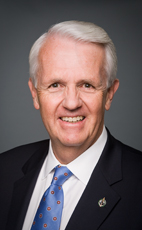Mr. Chair, I am honoured to participate in tonight's debate and discussion on the global rise of anti-Semitism.
Tonight I will be sharing my time with the member for Willowdale. I appreciate his intervention as well.
As is well known, promoting and defending freedom of religion are key Canadian foreign policy priorities. We believe that societies that protect freedom of religion or belief are more likely to protect all other universal rights and fundamental freedoms. Through the Office of Religious Freedoms, established within the Department of Foreign Affairs and headed by Ambassador Andrew Bennett, Canada works internationally to combat anti-Semitism and other forms of intolerance on the basis of religion or belief.
The religious freedom fund is supporting three initiatives addressing anti-Semitism.
The fund is supporting the Organization for Security and Co-operation in Europe's Office for Democratic Institutions and Human Rights' mandate by providing $500,000 to promote religious freedom, particularly given the increasing anti-Semitism and discrimination against Christians and Muslims in some OSCE member states. This project aims to promote international standards on freedom of religion, focusing on communities in central Asia and the south Caucasus.
The fund also supported the Auschwitz-Birkenau Foundation by providing $400,000 to assist with the preservation of the Auschwitz-Birkenau memorial site, part of the UNESCO world heritage list.
The most recent project supported by the fund is UNESCO's 2015 International Day of Commemoration in Memory of the Victims of the Holocaust. The aim of this $100,000 project was to mobilize decision makers in favour of policies that promote Holocaust education, genocide prevention, and Holocaust awareness through different educational tools. On January 27 of this year, many members of this House and our government participated in these moving ceremonies held throughout the world.
As some hon. members know, Canada became a full member of the International Holocaust Remembrance Alliance, IHRA, in 2009. Ambassador Bennett was appointed head of the Canadian delegation to IHRA in March of 2014.
Canada actively encourages all states to take a zero tolerance approach to anti-Semitism. This can be achieved in part by becoming a member of the International Holocaust Remembrance Alliance and supporting the principles outlined in the Ottawa protocol. The Ottawa protocol was in response to the alarming wave of anti-Semitism in Canada, especially on the campuses of many of our universities.
I would like to also recognize the member for Mount Royal tonight and thank him for his intervention in bringing some of those definitions and important measures forward for our understanding
The Ottawa protocol urges universities to combat anti-Semitism with:
...the same seriousness with which they confront other forms of hate. Specifically, universities should be invited to define antisemitism clearly, provide specific examples, and enforce conduct codes firmly, while ensuring compliance with freedom of speech and the principle of academic freedom.... Indeed, there should be zero tolerance for discrimination of any kind against anyone in the university community....
Canada must keep on fighting anti-Semitism by using all the tools at our disposal. I am pleased to add my voice in calling for zero tolerance not only on our university campuses but throughout the world. It is important that we reiterate “never again” to the Holocaust and to anti-Semitism. We must fight to bring it to an end with all the force we have available to us.

